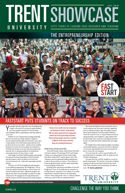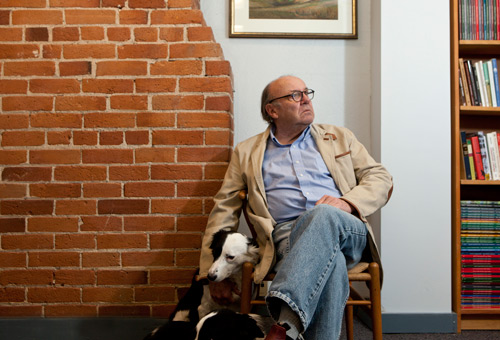
 |
 Searching for Truth, Hoping for Reconciliation
Trent Canadian Studies professor Dr. John Milloy acknowledges that he brings a decidedly “white perspective” to the study of the residential school system in Canada, but it’s a perspective that he feels is necessary. “As non-Aboriginal Canadians, it’s important that we tell the story of residential schools, because it is our story,” Professor Milloy says. “We built and operated the residential school system based on our ideology, and the horrors and the cruelty came from us and our culture.” Residential schools: history and affect An acknowledged expert on Canada’s residential school system, Prof. Milloy literally wrote the book on the subject. As a member of the Royal Commission on Aboriginal Peoples (1991 – 1996) he researched and produced a detailed report which provided a complete history of the residential school system. In 1999 it was published as a book, A National Crime: The Canadian Government and the Residential School System 1879 -1986. During his tenure on the Truth and Reconciliation Commission, Prof. Milloy was responsible for all research, but became most associated with a project to document dead and missing children. “Although not part of the original mandate, I was asked to find the names and circumstances for every child who died or went missing in residential schools going back to 1879,” Prof. Milloy says. “That proved to be a great challenge, particularly determining where children were buried and marking their graveyards.” A story that needs to be told He is hopeful that the Commission’s report will also have positive impacts on other Aboriginal issues. “If ongoing problems like native incarceration and missing women can be traced back to the residential school system, and if governments are serious about reconciliation, there will have to be programs developed and monies spent in these areas,” he says. But his work on the Commission also demonstrated to Prof. Milloy the difficulty of gaining momentum to address the problem and of getting true reconciliation. “From the beginning, the Commission understood that we were only taking first steps and that reconciliation was going to take years. The hope is that this will lead to recognition that the relationship between Aboriginals and Canada needs help and that there are ways to move forward. “ “It’s a form of national hypocrisy for Canada to join the United Nations and go overseas to bring justice to the world, while communities like Kashechewan continue to exist in northern Ontario,” Prof. Milloy added. |

































